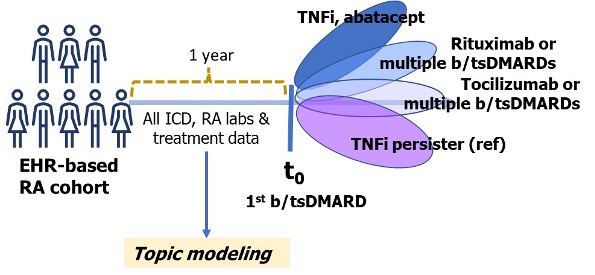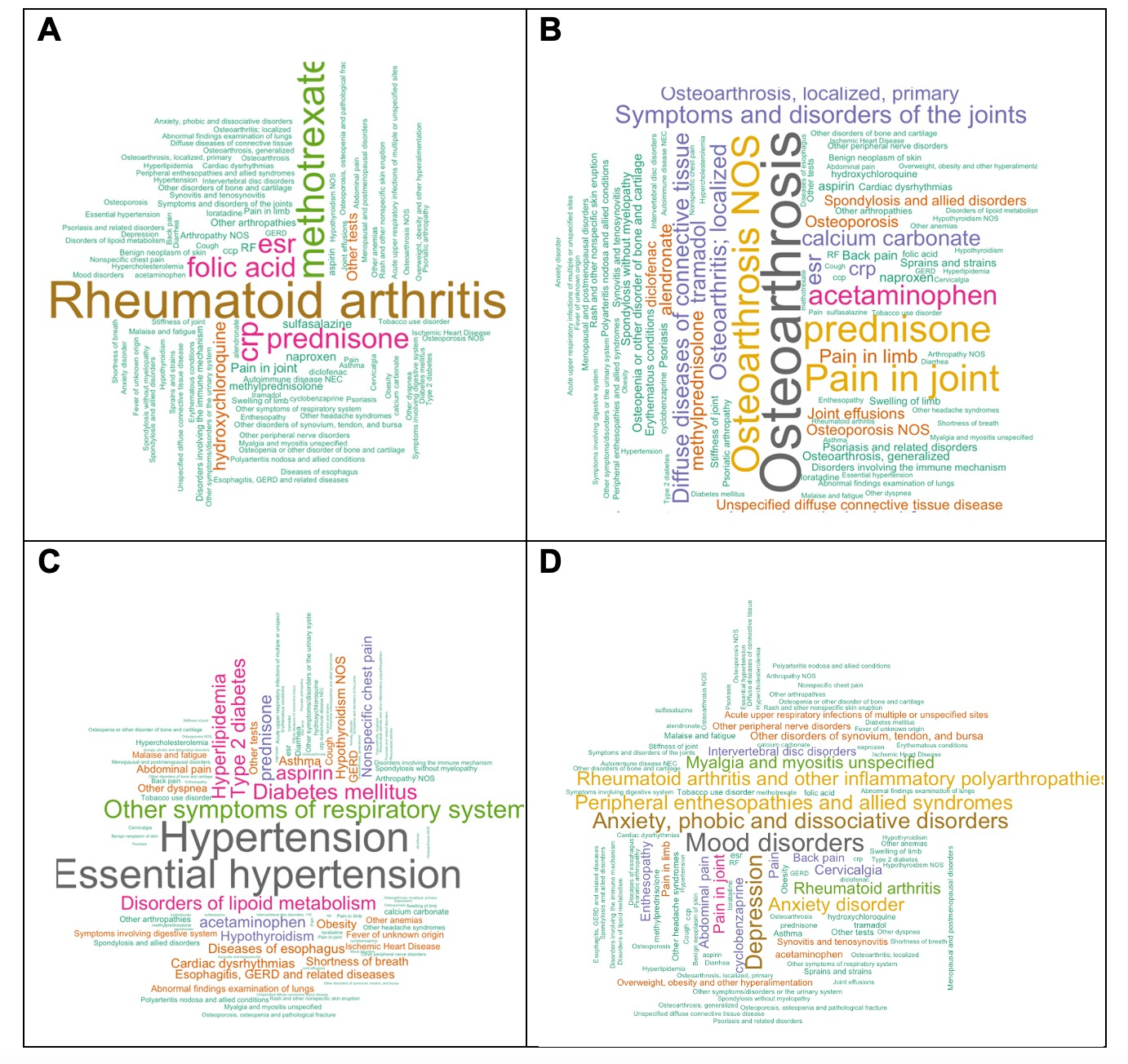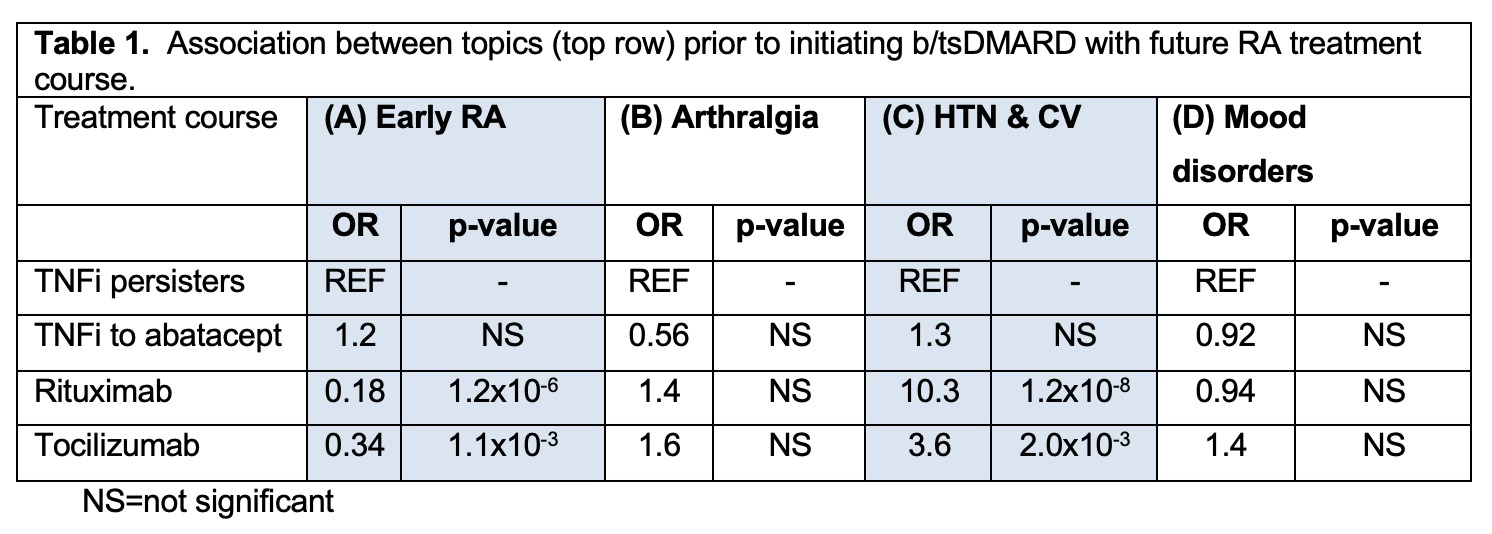Session Information
Session Type: Poster Session A
Session Time: 9:00AM-11:00AM
Background/Purpose: Strong clinical predictors for response to biologic and targeted synthetic disease modifying rheumatic drugs (b/tsDMARDs) in rheumatoid arthritis (RA) have yet to be identified. The majority of studies test associations between individual clinical factors, e.g., age, disease duration, with treatment response. Alternatively, individual variables can be grouped as a theme or topic, and then tested for association with an outcome, treatment response. Identifying potential topics using a data-driven method can be accomplished using topic modeling. Topic modeling performed on words in a newspaper grouped “music, film, performance” and “market, stock, share” into 2 topics, identifying entertainment vs finance-related terms respectively. The objective of this study was to identify the topics in a cohort of RA patients using their electronic health record (EHR) data prior to starting b/tsDMARDs, and to determine the association of these topics to their future b/tsDMARD treatment course.
Methods: We studied subjects from a validated EHR based RA cohort who initiated their 1st b/tsDMARD 2011-2019.In a previously published study, subjects were categorized based on the similarity of their treatment course after their 1st b/tsDMARD: (1) tumor necrosis factor inhibitor (TNFi) persister, (2) TNFi to abatacept, multiple b/tsDMARD and (3) rituximab or (4) tocilizumab (Figure 1). Structured EHR data: ICD codes, RA related laboratory data, e.g., anti-CCP, and RA related medication prescription data, e.g., prednisone, methotrexate (MTX), in the year prior to their first b/tsDMARD initiation (t0) were extracted; all variables had prevalence at least 5%.Latent Dirichlet Allocation (LDA), a topic modeling method, was applied to group the structured EHR data into topics. Multinomial regressions were constructed to test the associations between the 4 topics across the treatment courses in comparison to TNFi persisters (reference group), adjusting for age, sex, self-reported race, and year of 1st b/tsDMARD.
Results: We studied 1102 RA subjects, mean age 53 years, 77% female, 64% rheumatoid factor (rf), 76% were on TNFi at t0.The LDA model grouped the structured EHR data into 4 main topics: (a) RA on MTX, (b) arthralgia, (c) hypertension (HTN) and cardiovascular (CV) comorbidities, (d) mood disorders (Figure 2).Subjects in the RA/MTX topic cluster in the year prior to their 1st b/tsDMARD use had a higher-odds of eventually becoming TNFi persisters compared to those who will belong to the multiple b/tsDMARD/tocilizumab or rituximab groups (Table 1). Subjects belonging to the HTN/CV comorbidities topic had a lower-odds of belonging to the TNFi persister group compared to the multiple b/tsDMARD/tocilizumab or rituximab groups. Arthralgias and mood disorders did not associate more strongly with any future treatment course.
Conclusion: Topics derived from the structured EHR data of RA subjects prior to their 1st b/tsDMARD identified 2 topics differentiating future TNFi persisters vs those requiring multiple b/tsDMARDs.Topic modeling can provide an alternative method to study potential predictors for outcomes in RA and other rheumatic conditions.
To cite this abstract in AMA style:
Tang J, Weisenfeld D, Dahal K, Wang L, Bonzel C, Kawano Y, McDermott G, Cai T, Liao K. The “Topics” in the Electronic Health Record of Rheumatoid Arthritis Patients Before Initiating Targeted Therapies and Association with Future Treatment Course [abstract]. Arthritis Rheumatol. 2023; 75 (suppl 9). https://acrabstracts.org/abstract/the-topics-in-the-electronic-health-record-of-rheumatoid-arthritis-patients-before-initiating-targeted-therapies-and-association-with-future-treatment-course/. Accessed .« Back to ACR Convergence 2023
ACR Meeting Abstracts - https://acrabstracts.org/abstract/the-topics-in-the-electronic-health-record-of-rheumatoid-arthritis-patients-before-initiating-targeted-therapies-and-association-with-future-treatment-course/



